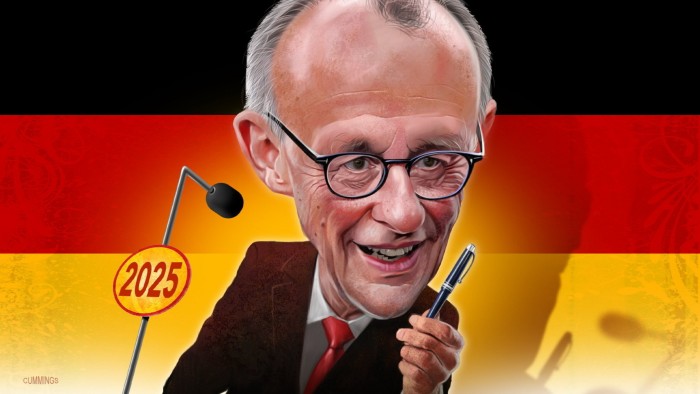Friedrich Merz, the man who yearns to be Germany’s next chancellor

Unlock the Editor’s Digest for free
Roula Khalaf, Editor of the FT, selects her favourite stories in this weekly newsletter.
When Friedrich Merz suddenly re-entered politics after a near 10-year absence, some described it as the Second Coming. Others said it was the return of the undead.
However you describe it, Merz’s rebound has been the most remarkable comeback in recent German history. And if the polls are right, it could climax early next year with his election as his country’s 10th postwar chancellor.
That would be an extraordinary moment of vindication for Merz. Sidelined from power in 2002 by his nemesis Angela Merkel, he spent the following years sulking on the sidelines before quitting the Bundestag in 2009 to pursue a career in business. For years it looked like he had petulantly slammed the door on the world of high politics and would never return. Now he is back, with his centre-right Christian Democratic Union in pole position to win snap elections on February 23 and return in triumph to the chancellery.
Carsten Linnemann, the CDU general secretary, who has known him for years, says Merz was made for the turbulent times Germany and the world now face, with Donald Trump soon to return to the White House and Berlin bracing for a cold wind from Washington. “We have to show pragmatism and realpolitik, not moralise and point fingers,” he says. “Merz’s frankness, clarity and straightforwardness are just what we need right now.”
German politics has been in turmoil ever since Chancellor Olaf Scholz last week pulled the plug on his coalition. Scholz faces a confidence vote in parliament on December 16. He will lose it, paving the way for a national poll in February, seven months ahead of schedule.
This week Merz and Scholz in effect fired the starting gun on the election campaign with an exchange of verbal blows in the Bundestag. Turning to Scholz, Merz said the whole country had felt “intense relief” at the collapse of his government. Then, in a typically withering sally, he predicted Trump would make short work of Scholz when he takes over the US government early next year. “He’ll fob you off like a lightweight,” he said, to thunderous applause from CDU MPs.
Merz’s parliamentary party has long been in awe of his rhetorical talent. “Boris Becker always used to say Wimbledon Centre Court was his living room,” says Linnemann. “Friedrich Merz’s living room is the floor of the Bundestag.” But his pugnacious style has occasionally got him into trouble, with some accusing him of aping the rhetoric of the far-right Alternative for Germany. In 2022 he accused Ukrainian refugees of “welfare tourism”. Last year he described the sons of immigrants as “little pashas”. He also suggested failed asylum seekers were getting lavish dental treatment at taxpayers’ expense while ordinary Germans struggled to get an appointment.
“I don’t think people want their chancellor to talk like that,” says Anton Hofreiter, a senior Green MP. But Merz says he’s just a straight-talker — unusual in German politics. “My view is that sometimes you have to talk plainly,” he told the FT. “And the problem is that people just aren’t used to that any more.”
Yet his occasional gaffes are seen as the reason why his personal approval ratings are lower than those of his party. According to Forschungsgruppe Wahlen, a pollster, only a fifth of voters thought him “particularly well suited” to the job of chancellor, though in more recent surveys his ratings have improved.
“As a person, voters find him unlikeable,” says Manfred Güllner, head of Forsa, the polling organisation. Forsa’s polling indicates the CDU is heading for a big victory in February. But many in the SPD say that when it comes to the crunch, voters will prefer the “calm”, “even-handed” Scholz to Merz. They also note that he has no government experience — unlike the seasoned Scholz. “Scholz has the better cards,” says Johannes Fechner, a senior SPD MP. “Merz has no real plan, for example on immigration. It’s all just hot air and sound bites.”
Born in 1955 in the west German town of Brilon, Merz studied law and was first elected to the Bundestag in 1994. After leaving politics he worked as a corporate lawyer at Mayer Brown, and served as chair of BlackRock Germany’s supervisory board between 2016 and 2020, becoming a millionaire in the process.
But Germany does not have much of a tradition of rich businessmen entering politics, and experts say his wealth and corporate background could count against him. He was pilloried on social media in 2022 when he flew his private plane to attend ex-finance minister Christian Lindner’s high-society wedding on Sylt, a popular holiday island for Germany’s rich.
Speaking to the FT this year, Merz blamed Germans’ negative view of him on “years of Merz-bashing that has targeted me personally”. There was a “completely distorted image of me”, nurtured by political opponents, he told the FT.
But other voters seem to find Merz’s tenacity appealing. After all, he only won the CDU leadership at the third attempt.
Some have compared his ambition and energy to that of former chancellor Gerhard Schröder, who as a young man famously shook the gates of the chancellery, saying: “I want in!”
“He’s a real fighter,” says Wolfgang Schroeder, a political scientist. “He’s someone who is desperate to be chancellor, who burns for it. It’s his life-long dream. And that’s an excellent prerequisite for the job.”
#Friedrich #Merz #man #yearns #Germanys #chancellor




